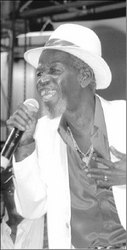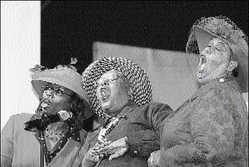STORY OF THE SONG - One line makes a 'Bangarang'
Published: Sunday | July 19, 2009

File
Strange Jah Cole
Mel Cooke, Gleaner Writer
For a song that has just one line of lyrics, Strange Jah Cole's Bangarang packs a wallop of a musical punch.
Not only did it hit number one when it was released in 1967, as Cole told The Sunday Gleaner, but Bangarang, on which saxophonist Lester Sterling does most of the lead duties, was covered relatively recently by Freddie McGregor. And the term's use in Parliament when the political battle got hot, after it has long ceased to be hip street terminology, seems to confirm that Bangarang has served the purpose of language preservation as a side effect to simply being a danceable tune.
In addition, Cole says there are those who claim it was one of the first reggae songs.
At the time, Cole was living in Denham Town and he went to Treasure Isle on Bond Street, downtown Kingston, without being specifically asked to come there for a recording session. When he got there, he was told that producer Bunny 'Striker' Lee was running a session upstairs and he naturally went up.
Happy
Lee was happy to see Cole, saying, "Pro, you are the right man I am looking for. I have a song called Bongo Chant. I want to do it Jamaican style with Lester Sterling."
"He played it for me with his mouth," Cole said, humming the melody for The Sunday Gleaner, much slower than the hit Jamaican version. As Lee finished humming, Cole picked up on the melody and sang the line "Moma no want no bangarang".
And they went into the studio to record.
When The Sunday Gleaner asks Cole what he was thinking when he did the line, he replies, "It is not what I was thinking, it is what the word means. 'Bangarang' means problems, so to break it down it is 'mother no want no problems'."
He points out that many people sing "woman no want no bangarang", but he actually said Moma.
John Crow Skank
"The reason is she don't want the children to give her any problem," Cole said.
Among the musicians with whom Lee worked at the time were Lloyd Chalmers, Aston and Carlton Barrett and Robbie Shakespeare. Cole definitely remembers keyboard player Glen Adams playing on Bangarang, introducing what was called the 'John Crow Skank' style into Jamaican music in the process.
"I have done many hit songs," Cole said, "but Bangarang stand out."
It continues to have an impact, Cole performing Bangarang at the Montreal Jazz Festival in early July when he appeared along with Leroy Sibbles, Marcia Griffiths, Hopeton Lewis, Ken Boothe, Judy Mowatt, The Tamlins and Bongo Herman.
And he has put out two CDs recently, which he hopes will create a 'bangarang' in terms of impact, Lucky Dog, done with his son 'Squiddley' Cole, and Riding High, which Strange Jah Cole produced along with G Bravo from Leggo Studio.

Winston Sill/Freelance Photographer
Aloun Assamba (right), Audrey Hinchcliffe (centre) and Andrea Messam perform at the Powerful Women and Men charity concert on June 21.
It is approaching the latter stages of the 2009 Powerful Men and Women Perform for Charity concert and good-natured tomfoolery at the National Indoor Sports Centre, Independence Park, St Andrew. Although the earlier stages of an event that provides a healthy dose of humour to go along with song, dance and drama have been good, going down the home stretch, it is flagging. Until a trio of ladies, including Glynnis Salmon and Aloun Assamba, showed that they were literally 'Big on Dub' as they danced to the Heptones' Fatty Fatty.
Intentions are stated clearly in the song:
I need a fat girl, fat girl (fat girl tonight)
I need a very, very fat girl (fat girl tonight)
I'm in the mood, the mood
I need some food, some food
I'm feeling rude, so rude
The large audience cheered the large-as-life ladies on as they moved more like ponderous battleships than nimble speedboats, the expected laughter coming as the trio theatrically puffed and hauled themselves off-stage, claiming tiredness and strains.
There is, however, a larger issue than a moment of laughter. Jamaicans do not mind fat ladies, on or off stage - that is, if songs and popular entertainment personalities are anything to go by.
From Claudette Pious to the late Honourable Louise Bennett-Coverley on stage and screen, through to 'Bubbler' in the dancehall, the more rotund ladies have had their place.
And they have been celebrated, with Leftside and Esco's post-2000 Tuck Een Yu Belly a rare tipping of the scales towards criticism. Even then, there was a disclaimer at the beginning, making it clear that the song was not speaking to women over 35 or who have already had children.
As for the rest who are found to be in breach of belly laws, the dancehall duo said:
"Some gal belly bag over like shirt
One bag a flab dem need some ab work
Big butt an' big gut no dat nuh work
An me nah even smile nor smirk".
The women who were deemed over the belly limit were not left defenceless, as deejay Kiprich assured them they were fine as "me nah look yu belly".
In the late 1980s, Shabba Ranks had also put the curious combination of protuberances before and behind into song, saying in Gal Yu Good:
"Some gal a holler sey dem fat
An maaga like chicken back
It betta fi tan so dan di wagga wagga fat
Fi have belly a front an belly a back
Tell de worl' sey dat is anorexal fat"
And in the hit Ting a Ling, Shabba remarks that the lady's "belly haffi flat like willy penny".
Long before women were taking 'fowl pills' in the late 1990s to fatten themselves for being plucked out of the single lane (or, maybe, at least not being dumped for a rounder model), a drug named 'anorexal' was the weapon of choice in the fat wars. And dancehall, where a lot of the artificially acquired 'fatness' was displayed, was quick to record it. In the late 1980s, Little Harry deejayed in Anorexal Body:
"You body look good an' it look fat
But the fat it no natural
She want one pound weight she take the anorexal
Two pound weight she take the anorexal"
He goes on to comment:
"This is one thing whe me cyaa understand
Dem take the anorexal fi have big bottom
When yu see that it draw your attention".
Just maybe, it was under-standable in an era where the skinny woman was derided. The most notable 'maaga woman' dancehall song of the 1980s was Red Dragon's Kru Krum Krum, the chorus of which went:
"Kru krum krum, that's the sound of a bone
Kru krum krum, leave maaaga gal alone".
And if the men persisted, Red Dragon warned further:
"If yu trouble maaga gal dem wi gi yu blue bone"
MC























